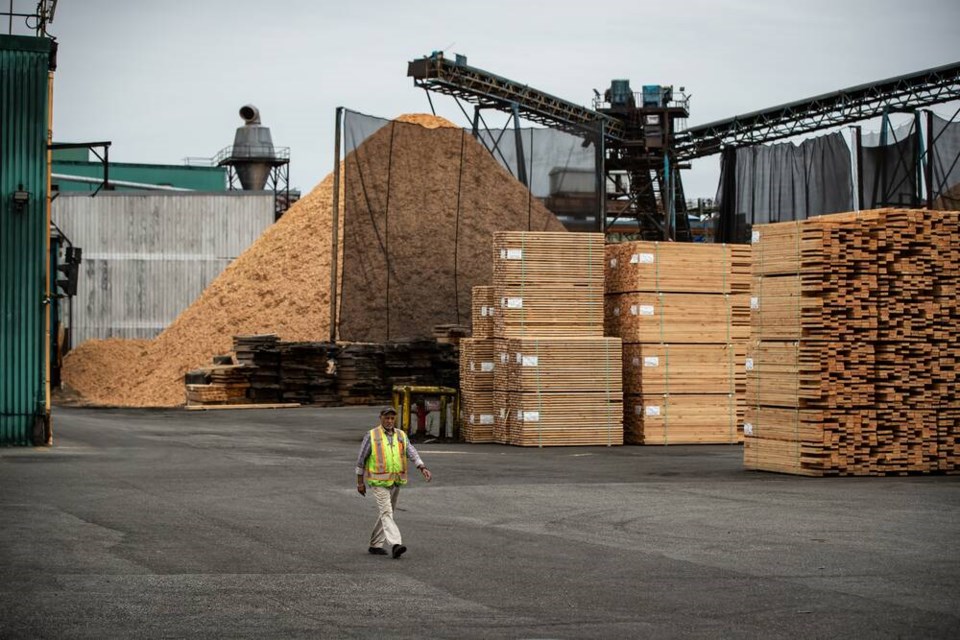A wide shadow of uncertainty has been cast over B.C.’s forestry sector by U.S. President Donald Trump’s threat to impose a 25-per-cent tariff on its lumber products, a measure now delayed by a month.
Several industry groups have released statements criticizing the tariff as unnecessary and harmful for both sides, a sentiment echoed by Premier David Eby, who vowed full support for the provincial sector.
Prime Minister Justin Trudeau said Monday after speaking with Trump that the tariff threat has been paused for 30 days while Canada and the United States work together on plans to increase border safety and target organized crime.
Eby said after the delay was announced that the uncertainty is especially hard on the forest industry.
He said forestry companies aren’t sure how they should invest or if they should put money into their companies at all.
Forest companies are left not knowing what to put their money in or how to invest, he said.
“Our goal for industries like forestry, mining, energy and others, as well as manufacturing, will be to support them to find those overseas markets, to ensure that stability,” Eby said Monday during a media availability in Vancouver. “We know we have what the world needs. We have confidence in that.”
Eby said earlier on Monday that the tariffs, if implemented, would impact many sectors, but that he was most worried about “the families that are dependent on the forestry sector.”
In the Alberni Valley, for example, about 400 to 500 people work in forest-related businesses, said Jolleen Dick, chief executive of the Alberni Valley Chamber of Commerce.
Chamber officials plan to meet Wednesday with officials from all levels of government to discuss the situation.
North Cowichan Mayor Rob Douglas fears tariffs could impact the future of forestry-related companies in the area, home to a pulp and paper mill, sawmills and a value-added remanufacturing facility.
“Forestry is still one of our biggest employers in the municipality, in the region,” Douglas said. “Tourism has grown a lot in recent years but definitely doesn’t have the same impact as the forestry sector and pulp and paper and manufacturing.”
Douglas said mills are responsible for close to $5.5 million annually in property taxes to the municipality alone, with more going to the regional district and school district.
Eby noted the sector has already been hit by forest fires, pine beetle infestations and softwood lumber duties of 14.4 per cent when it ships to the United States.
Tariffs would also bring pain for U.S. consumers, the premier said, since demand for homebuilding will be on the rise to replace thousands of buildings lost in the Southern California wildfires.
“I’ve heard the president say he doesn’t need our lumber, and that’s technically true,” Eby said. “But in order to do that, they’d have to open up state forests down the west coast of the United States for logging.”
Eby said the forestry sector is asking for — and will receive — support in restructuring “to be able to respond to this new reality, to access those new markets and to ensure sustainable forest jobs into the future.”
Forest Products Association of Canada president Derek Nighbor said in a statement that the United States can meet about 70 per cent of its homebuilding lumber needs, but that’s without taking into account the rebuilding around Los Angeles and in North Carolina after hurricane Helene last year.
The BC Lumber Trade Council called the tariff plan a “punitive, unjustified protectionist measure,” adding in a statement that the 25 per cent charge on top of the current duties would “disrupt trade, raise costs for consumers, and threaten jobs and communities on both sides of the border.”
“For Canadian producers, higher tariffs erode competitiveness and put mills under financial strain, leading to curtailments, job losses, and economic harm to forestry-dependent communities,” the council statement said.
“Unjustified trade barriers weaken both economies and put workers, businesses, and consumers at risk.”
The latest figures for B.C. provincial trade data on forest product exports to the United States show a value of almost $6.2 billion for the first 11 months of 2024 — about 58 per cent of total forest product exports from the province.
Forest product exports to China — including Hong Kong and Macau — are ranked second at $2.3 billion or 22 per cent of total exports, followed by Japan at $806 million or eight per cent.
The threat of the tariffs has also sparked opposition within the United States, with National Association of Home Builders chairman Carl Harris saying in a statement that the trade barrier “will have the opposite effect” of the Trump White House’s expressed goal “to lower the cost of housing and increase housing supply.”
Eby echoed those sentiments, noting Canadian lumber is a reliable and cost-effective way for U.S. homebuilders to supplement their construction needs even with the softwood lumber duties that had been in place before the tariff threats.
“It’s going to make it more expensive for L.A. to rebuild, certainly, at a time of increased demand,” Eby said. “But right across the United States, it’s going to hurt families on both sides of the border, and it doesn’t make any sense.
B.C. Conservative forests critic Ward Stamer said uncertainty is pervasive across the forestry industry in the province, since no one knows for sure how the U.S. construction market will react to the tariffs.
“Is the market going to be able to respond positively and still want to continue to buy our products? Or is the market going to say, ‘No, it’s too expensive now,’ and next thing we know we have mills closing?
“That’s what’s happening today, the phone has been ringing off the hook because of the uncertainty that we don’t know what these effects will have on the markets,” he said.
>>> To comment on this article, write a letter to the editor: [email protected]



